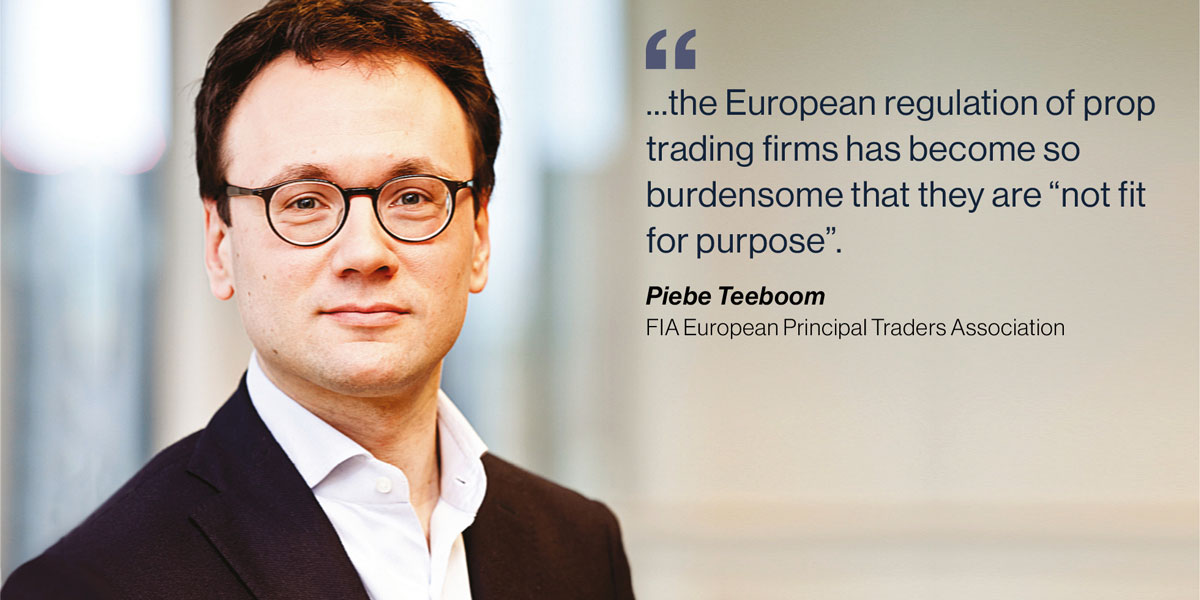 European financial regulators are waging war against proprietary trading firms, describing their operations as akin to video games which cost investors money and lead to “reckless behaviour”. But could this zealous approach have a negative impact on competitiveness – and, by extension, market liquidity? Gill Wadsworth explores.
European financial regulators are waging war against proprietary trading firms, describing their operations as akin to video games which cost investors money and lead to “reckless behaviour”. But could this zealous approach have a negative impact on competitiveness – and, by extension, market liquidity? Gill Wadsworth explores.
Regulatory crackdown
At the start of 2024, The European Securities and Markets Authority (ESMA), the EU’s financial markets regulator and supervisor, launched a Common Supervisory Action to assess “the implementation of pre-trade controls (PTCs) by EU investment firms using algorithmic trading techniques”.
PTCs are used by investment firms to carry out checks at order entry to limit and prevent sending erroneous orders for execution to trading venues. Following the May 2022 “flash crash” (triggered by a fat-fingered Citi trade for a mistaken GBP1.4bn), ESMA and national authorities have focussed their attention on the implementation of PTCs in the EU, gathering evidence through questionnaires submitted to a sample of EU investment firms. The latest CSA represents a more detailed exploration into how firms are using PTCs across the region – and it’s not expected to be good news for high frequency traders, who are often blamed for the domino effect that can exacerbate market events through their heavy selling.
In theory, a review of PTCs should reduce the likelihood of erroneous trades and increase the stringency of algorithmic trading checks. In practice, there are concerns that this could adversely impact prop traders’ ability to execute.
Retail concerns
Individual countries are also taking regulatory action, often due to concerns over the protection of retail investors and/or amateur traders. In July 2024 Consob, the Italian watchdog, warned investors against the risks associated with offers promoted by prop trading firms on the internet and social media “of exercises that simulate an online trading activity in a kind of finance video game aimed at passing skill tests and making a profit”.
This followed similar alarms raised by FSMA, the Belgian financial authority, which said prop trading firms are “parties that trade for their own account and offer consumers the opportunity to play a shadow investment game, a practice that costs money and can lead to reckless behaviour”.
The Spanish regulator CNMV has issued similar concerns about the regulation surrounding prop trading firms.
A risky business?
Prop trading firms allocate their own capital, rather than that of clients, to traders who participate in a range of financial markets and use a variety of financial instruments, and often speculative trades, to generate profits for the institution.
Any profits are typically shared between the trader and the firm. Prop trading firms may have their in-house traders or accept outside individuals to join once they have demonstrated their ability from completing a course, which the trader pays for.
This is where the European regulators appear to take issue, with Consob stating: “[We] have received several reports from users who have signed up for such offers. The complaints concern both the level of difficulty of the tests, which are allegedly contrived to push “players” to try again, and the failure to share the alleged profits.”
Similarly, FSMA says: “These courses are not easy, not cheap and often consumers have to take, and pay for, several of them before they can successfully complete them. There is a good chance that some consumers never pass the courses. This is how prop trading firms earn money from them.”
They add that traders are often ‘shadow investing’ and may never actually make a real trade and may not be compensated, while the prop trade firm is able to emulate their work and ultimately take the credit.

Market contraction
The threat of additional regulatory burden on prop trading firms is a concern for Will Mitting, founder of Acuiti, which researches the prop trading market. He says that the sector is already suffering under the additional capital rules and governance requirements that followed the introduction of the Investment Firms Prudential Regime (IFR/D).
Further, new rules added to MiFID II, specifically restrictions regarding algorithmic trading, are seen as making the EU and UK less competitive, where Mitting says over a quarter of proprietary trading firms based in these jurisdictions are considering giving up their MiFID II licences.
“Regulators need to strike a sensible balance between fair regulation to ensure orderly markets and overly burdensome regulations that increase the barrier to entry and the costs of participation to an unsustainable level,” urges Mitting.
Acuiti’s proprietary trading insight report published in July this year reveals regulation to be the number one challenge for firms in the first half of 2024, noting the issue has become more problematic for firms over the last two years.
“Overall, the compliance burden for prop firms has increased massively over the past decade. At the same time, the number of new firms launching has dropped. These two trends are without a doubt related. Regulators may think it is better to have smaller numbers of larger firms to regulate but that has a very real impact on innovation and competition,” Mitting says.
One of the key motivations for firms to undertake prop trading – in addition to making money – is securing additional pools of liquidity which helps alleviate trading pressure in difficult markets.
A negative impact
Mitting says that over-regulation of prop trading firms, which forces them to behave as if they are taking risk with clients’ money rather than their own, will likely drive firms out of the market, taking much needed liquidity with them.
“At the heart of the over-regulation of proprietary trading firms is a blurring of the collective risk that the proprietary trading industry poses versus the individual risk of each firm. Of course, with proprietary trading firms responsible for most of the liquidity provision across global markets, they fulfil a vital role in the market. However, on an individual level, firms pose relatively little systemic risk.”

Piebe Teeboom, secretary general of the FIA European Principal Traders Association, agrees that the European regulation of prop trading firms has become so burdensome that they are “not fit for purpose” and the impact on competition is profound.
“The prudential regulatory regime for trading firms is just not sufficiently proportionate, and that has had the effect of driving liquidity away,” he says.
According to Eoghan Hartigan, practice lead for Bovill Newgate’s capital markets wing, the impact of regulation has been particularly acute for small and medium-sized firms which have struggled to meet the new capital requirements.
“Prop trading firms have had a difficult time with the transition [to IFR/D] because their capital requirements skyrocketed and that has created a competitive difficulty.”
Driving smaller and medium sized firms out of the market is a concern for the FIA which believes participants need a range of liquidity sources.
Teeboom says: “Our focus is on creating a level playing field with real open competition between different types of firms that provide liquidity. For us, a catch word here is diversity. Diversity means or implies competition, meaning that market structures need to be open and should not be predicated to specific incumbents.”
Time to consult
This June, ESMA launched a discussion paper with a view to reviewing the investment firms’ prudential framework.
The discussion paper includes the adequacy of the current prudential requirements; an analysis of the existing methodology; risks not covered by the current framework; and incorporates prop trading firms’ concerns about the IFR/D.
Teeboom welcomes the possibility that the rules might be simplified.
“We need to recognise that in Europe, we’ve built up a very complex system with very high compliance requirements. Some of those requirements have actually fallen short in doing what they were built for such as reducing risk and making the market safer. Any review should look at keeping the best parts of the regulation, but also not be shy in removing rules that we all agree don’t work,” he says.

Hartigan calls on firms to participate in such reviews, noting that they present an opportunity to formulate simpler, clearer regimes.
“It is important firms do engage because while they are willing to comply with regulations, they want clarity about what they have to comply with. These are very complex areas and if the regulations aren’t clear, that can be very challenging. My encouragement to regulators would be, where possible, to simplify regimes,” Hartigan says.
In response to industry concerns about the regulatory burden, a spokesperson for ESMA told Global Trading: “The objective of regulations is to ensure prop traders conduct their business appropriately and maintain safe and sound operations.”
Despite this reassurance, there remains considerable uncertainty for prop traders in how they will be regulated in future. Proponents of a simpler, less burdensome regime will need to take the current opportunity to feed into reviews and consultations and hope that their voices are heard.

 European financial regulators are waging war against proprietary trading firms, describing their operations as akin to video games which cost investors money and lead to “reckless behaviour”. But could this zealous approach have a negative impact on competitiveness – and, by extension, market liquidity? Gill Wadsworth explores.
European financial regulators are waging war against proprietary trading firms, describing their operations as akin to video games which cost investors money and lead to “reckless behaviour”. But could this zealous approach have a negative impact on competitiveness – and, by extension, market liquidity? Gill Wadsworth explores.